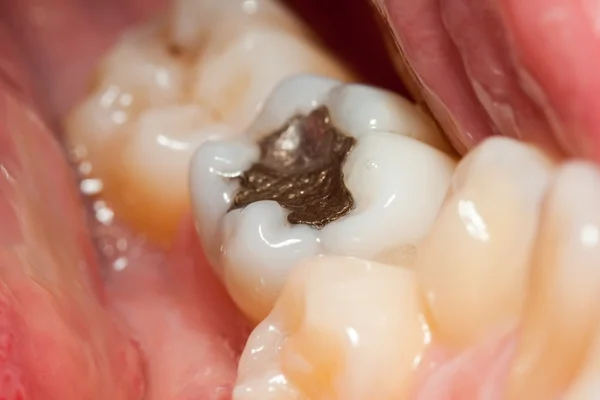Silver amalgam dental restorations (fillings) used to be the only inexpensive option for filling teeth. Now composite resin, a tooth-coloured filling material, is available. It is more expensive than amalgam, but much cheaper than gold or porcelain. Unfortunately, white composite is less durable than amalgam.
Benefits of silver amalgam fillings
Silver amalgam fillings are safe, durable, and inexpensive. For people with high dental caries rates (more than one new area of decay per year), this material may be a best choice for back teeth.
Risks with silver amalgam fillings.
There is concern about the use of silver amalgam because it contains mercury. These concerns centre around possible toxicity to the body and harm to the environment.
Millions of people now have amalgam fillings in their mouth. The material has been used for more than 150 years. The well conducted long-term studies have not been able to find any measurable harm to the body with the use of the material. Scientific studies have concluded that is it safe to use silver amalgam fillings.
Mercury is harmful to the environment especially in large amounts. A very small number of people may have allergy to one of the components of silver amalgam. The most release of mercury vapour (the more dangerous form) occurs while removing old silver fillings. All dentists use special equipment to reduce exposure to themselves, staff, and patients.
What is in dental amalgam?
Dental amalgam components vary with brand and type but generally contain approximately 70% silver, 20% tin, 5% copper, 3% mercury, and 2% zinc.
Why is there so much concern over Mercury in amalgam fillings?
Our common sense tells us that putting heavy metals in the body might be harmful. But mercury is a metal that occurs naturally in our environment. It can exist as a liquid, which is commonly used in thermometers. It used in many industries in large amounts although governments are working to reduce this use.
Everyone is exposed to small amounts of mercury even when from contact with soil and food. For instance, fish stocks contain increasing amounts of it.
Just like with almost all substances, harm typically comes depending on the amount of the substance. And depending on a person’s career and industry, they may be exposed to much higher amounts of it. Silver fillings contain only tiny amounts of mercury.
Why is mercury in amalgam fillings anyways?
Mercury is used in the material because it is pliable and helps in the placement of the sealing in the cavity. All of the elements are mixed, and the mixture is pressed onto the tooth, then the cavity is filled.

